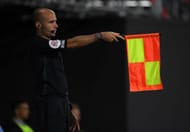Former Arsenal manager Arsene Wenger turns 71 this week. And while he became an unfair figure of fun during his final years at the Emirates Stadium, his radical proposal to reverse the offside rule deserves more credit than the snide scepticism it has been treated with since it was initially made public earlier this year.
Last weekend we saw the very worst of VAR, and how our impossible pursuit of perfection is in danger of destroying the moments of magic that make the game so emotionally powerful. The decision to disallow Jordan Henderson's injury time winner for Liverpool in the Merseyside derby remains a hot topic of debate, and more incidents like this will continue to follow until there is a change.
Why accuracy is impossible to achieve

It is impossible to guarantee the accuracy of the still frame images and technical lines that now determine if a player was onside or offside when the ball was played forward. The decision to declare Sadio Mané offside in the build-up to the goal remains open to debate due to the frame rate and the determination of the point when the ball was actually played to him.
This is not what football should be about. A last minute derby winner brings a release of emotion for the winners and losers that is difficult to replicate. It makes for the drama that generates billions in television revenue across the world. While the decision may actually have been technically correct, it is clearly wrong that the game has come to making decisions in this way.

Without the VAR, the assistant referee would have given the benefit of the doubt to the attacking player, and the exceptionally fine margins mean that there was very little doubt.
The goal would have stood, Everton would have had no complaints about the decision, and with the exception of earlier incidents involving Jordan Pickford and Richarlison, the match would have been remembered for the right reasons.
But once again we are talking about the absurdity of the offside decision. Not the rule or the law, but the decision, and the way the decision was reached. The current advice regarding offside without the benefit of VAR is fine, and the guidance to officials to give the attacking player the benefit of the doubt on tight calls has been to the betterment of the game.
But it is VAR that has now made the rule obsolete.
The world game

The vast majority of games that take place around the world do so without VAR, and the offside rule is applied without detailed dissection. Assistants are entrusted to get it right, and they are the best person placed on the pitch to make the call, despite the natural protestations that follow from supporters, managers and usually out of position defenders.
Of course, the game does need the offside rule, and the alternative proposed by Arsene Wenger in his new role as FIFA Head of Global Development is far easier to apply at all levels of the game (ie, with or without VAR) than the current rule that is no longer fit for purpose. It is only a small change, but it is a significant one.
Arsene Wenger's radical proposal
“You will not be offside if any part of the body that can score a goal is in line with the last defender,” Arsene Wenger explained.
“Even if other parts of the attacker's body are in front. That will sort it out, and you will no longer have decisions about millimetres and a fraction of the attacker being in front of the defensive line.”
Immediately, it was highlighted that the change only technically moves the problem, as the frame rates and measurement lines will again come into play in order to establish if daylight between the attacker and the last defender is actually visible. That is indeed correct, so what are the benefits?

Basically, the benefit is in the fact that there will be far fewer incidents requiring this stringent examination. In the majority of tight calls there will clearly be no daylight, or clear daylight, between the two players concerned.
Of course, VAR may still need to examine one or two closely, but this will happen once or twice a season, rather than the current situation of once or twice every weekend.
The rule change can also be applied to games played without VAR. The responsibility remains with the assistant referee, but it is rare that an attacking will test the rule to the extent that he moves that far ahead of the defender.
No daylight is a much clearer visual than what is allowed in the current law, and fewer tight calls will naturally lead to fewer mistakes.
Perfection is impossible to achieve in these situations, but Arsene Wenger's proposal would significantly reduce the number of situations that arise. That is the beauty of it. Meanwhile, VAR remains a source of controversy, searching for perfection in a game that is built upon its unpredictability with results often decided by mistakes.
A future with VAR in mind

Players and managers make mistakes each and every weekend, some they get away with, some they don't.
The match officials will not get everything right either. While they take public criticism without the opportunity to respond, those criticising them from their position in the game should take a closer look at their own performances before judging those of others.
Many believe that VAR will destroy the spontaneity of our game, and their concerns are justified. However, it will evolve and adapt over time, but the game must evolve and adapt with it.
Arsene Wenger's proposed rule change is the first designed specifically to suit VAR, and if successful, could lead to a whole new thought process of how we shape the future of football.
